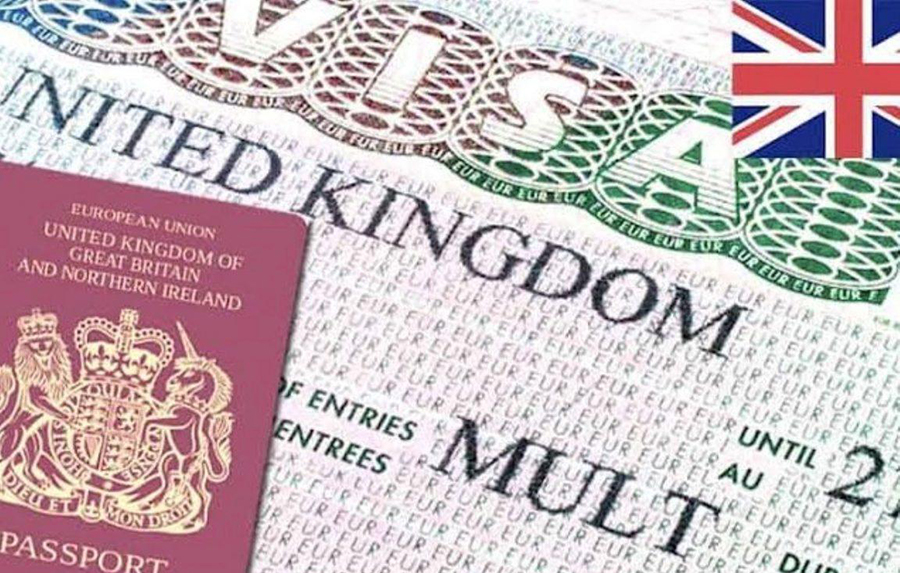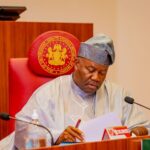The Senate President and Chairman of the National Assembly, Senator Ahmad Lawan, has warned that the decision to include Nigeria on the United Kingdom’s COVID-19 red list poses a strain on the diplomatic relations between both countries.
He urged the British parliamentarians to prevail on their government to remove Nigeria from the list.
- Fishing festival: Monarch seeks modern fish preservation method
- School feeding is improving enrolment in Kaduna communities- Focal person
He gave the warning on Tuesday after the Senate adopted a motion by Senator Ike Ekweremadu (PDP, Enugu) who asked the UK to remove Nigeria from the COVID-19 red list and be sensitive to the diplomatic relations between both countries.
Lawan said: “Let there be justification for it. We are not saying that they cannot put any country on the red list, including Nigeria, but there must be reasons for doing that.
“And of course, Nigeria has done so well to the admiration of many countries in the area of containment of COVID-19.
“Therefore, we don’t see any reason why Nigeria will be on that so-called red list.
“I believe that Nigerians deserve better treatment from the British government.”
He also urged the British Parliament to mount pressure on its government to remove Nigeria from the red list.
The Senate urged the Federal Government to constructively engage the British authorities with a view to reversing the ban.
It also asked the major vaccine powers, namely, Britain, Canada, America, and the European Union, among others, to take urgent and bold steps to ensure vaccine equity in the best interest of the entire human race.
Earlier, Ekweremadu said Nigerians had consistently complied with all the COVID-19 protocols required by the World Health Organisation and UK Government for travellers prior to the ban.
He said targeting African countries, especially in the COVID-19 travel ban, amounted to profiling and discrimination as well as an attack on Nigeria’s cordial diplomatic relationship with the UK.
Also, the House of Representatives yesterday mandated its Committees on Health and Foreign Affairs to interface with the Ministries of Health, Foreign Affairs and the presidential task force on COVID-19 on the best ways to resolve the travel ban.
This followed the adoption of a motion by the House Minority Leader, Ndudi Elumelu (PDP, Delta) who noted that placing Nigeria on red list negates known international conventions.
“This decision, if left unchallenged, will stop thousands of Nigerians that normally come back home at this time of the year to boost the social and economic activities of the country from coming into the country, thereby causing the nation serious revenue loss”.
The Nigeria Governors Forum also yesterday described the Canadian and the British Governments’ travel ban on Nigeria as precipitate, unfair and discriminatory.
NGF Chairman and Ekiti State Governor, Kayode Fayemi, in a statement, said it was unfair that Nigeria was listed among countries placed on the travel ban, despite having only three cases of the variant detected less than a week ago.
He urged the WHO to intervene by setting uniform standards acceptable to all for banning countries across the globe.
“As we know, vaccine hesitancy is quite high and for many reasons including disruptive announcements like this which could exacerbate distrust of the vaccine and heighten hesitancy.
“World leaders and stakeholders in the West need to remember that with the COVID-19 pandemic until everyone is free, no one is free. Variants will continue to appear and spread across the globe as long as global herd immunity has not been achieved.
“We call on countries to be guided by science and fairness in setting the criteria for updating their red list.
“We encourage both public and private stakeholders to continue to support vaccination efforts and address hesitancy. We encourage Nigerians not to be discouraged and to get vaccinated as soon as possible.
“As a platform for the 36 democratically elected governors of the country, the NGF believes it reserves the right to speak for its people.
“Besides, the NGF was proactive and ahead in the Polio eradication program in Nigeria, in the country’s response to the Ebola virus, and lately in the response against the coronavirus pandemic,” he said.
Three new cases of Omicron detected in Nigeria
Director-General, Nigeria Centre for Disease Control, Ifedayo Adetifa, in a statement, said three additional cases of the Omicron variant were detected in Nigeria in people with recent travel history to South Africa.
Three cases of Omicron had earlier been announced in the country on December 2021.
The statement said “this brings the total number of confirmed cases of the Omicron variant detected in Nigeria to six
“All the Omicron cases so far were detected in persons with recent travel history to South Africa in November.”
He said the NCDC, through the National Reference Laboratory, continued to coordinate genomic surveillance activities across Nigeria to sequence all positive COVID-19 samples from international travellers arriving in Nigeria.
“This includes sequencing of positive samples from international travellers from October 2021 to date.”
“In line with Article 44 of the International Health Regulations 2005 (IHR) reporting framework, the Federal Government of Nigeria through the NCDC has also been notified by the UK Government of seven cases of travellers from Nigeria with the Omicron variant,” the statement reads.
“Given the reports of increasing numbers of Omicron cases in the UK, the NCDC is also prioritizing the sequencing of COVID-19 positive samples in travellers with a history of travel to the UK.”
Why we added Nigeria to travel red list – British High Commissioner
The British High Commissioner to Nigeria, Catriona Laing, has explained why the UK added Nigeria to the travel red list over the Omicron variant.
Laing, in a statement by Ndidiamaka Eze, Press and Public Affairs Officer, British High Commission, said the decision was to protect the public health of British nationals while the government tried to understand the new variant.
She said the decision would be reviewed at the three-week review point on December 20, 2021.
“This decision is a precautionary measure to protect public health in the UK, whilst we try to understand this new variant.
“I know that this decision will have a significant impact on people in both our countries, particularly at this time of year.
“We continue to work very closely with the Nigerian authorities in tackling the pandemic and commend their ongoing work.”
By Abdullateef Salau, Saawua Terzungwe & Balarabe Alkassim

 Join Daily Trust WhatsApp Community For Quick Access To News and Happenings Around You.
Join Daily Trust WhatsApp Community For Quick Access To News and Happenings Around You.


